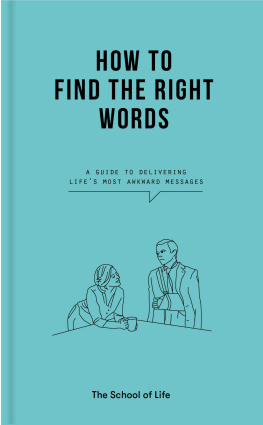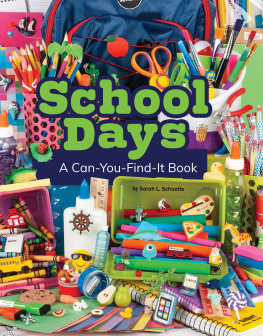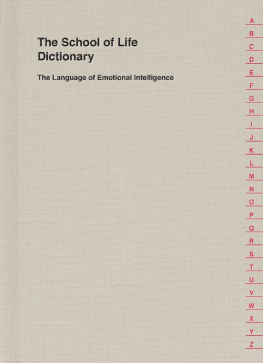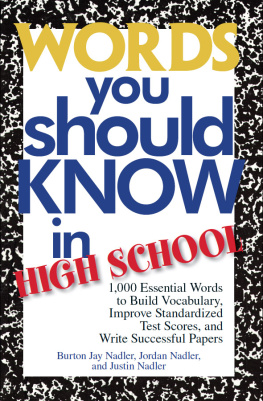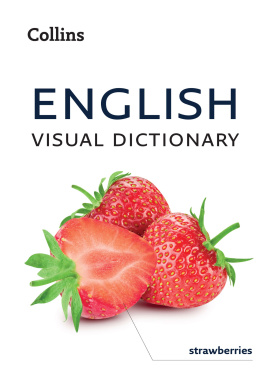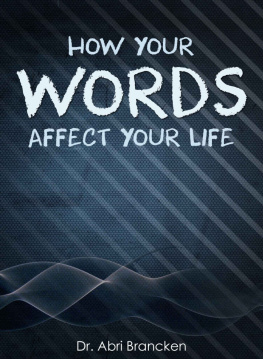Life Of School The - How to Find the Right Words
Here you can read online Life Of School The - How to Find the Right Words full text of the book (entire story) in english for free. Download pdf and epub, get meaning, cover and reviews about this ebook. year: 2021, publisher: School of Life, genre: Home and family. Description of the work, (preface) as well as reviews are available. Best literature library LitArk.com created for fans of good reading and offers a wide selection of genres:
Romance novel
Science fiction
Adventure
Detective
Science
History
Home and family
Prose
Art
Politics
Computer
Non-fiction
Religion
Business
Children
Humor
Choose a favorite category and find really read worthwhile books. Enjoy immersion in the world of imagination, feel the emotions of the characters or learn something new for yourself, make an fascinating discovery.
- Book:How to Find the Right Words
- Author:
- Publisher:School of Life
- Genre:
- Year:2021
- Rating:3 / 5
- Favourites:Add to favourites
- Your mark:
- 60
- 1
- 2
- 3
- 4
- 5
How to Find the Right Words: summary, description and annotation
We offer to read an annotation, description, summary or preface (depends on what the author of the book "How to Find the Right Words" wrote himself). If you haven't found the necessary information about the book — write in the comments, we will try to find it.
How to Find the Right Words — read online for free the complete book (whole text) full work
Below is the text of the book, divided by pages. System saving the place of the last page read, allows you to conveniently read the book "How to Find the Right Words" online for free, without having to search again every time where you left off. Put a bookmark, and you can go to the page where you finished reading at any time.
Font size:
Interval:
Bookmark:
HOW TO FIND
THE RIGHT WORDS
HOW TO FIND
THE RIGHT WORDS
The School of Life
Published in 2020 by The School of Life
70 Marchmont Street, London WC1N 1AB
Copyright The School of Life 2020
Designed and illustrated by Marcia Mihotich
Printed in China by Leo Paper Group
All rights reserved. This book is sold subject to the condition that it shall not be resold, lent, hired out or otherwise circulated without express prior consent of the publisher.
A proportion of this book has appeared online at www.theschooloflife.com/thebookoflife
Every effort has been made to contact the copyright holders of the material reproduced in this book. If any have been inadvertently overlooked, the publisher will be pleased to make restitution at the earliest opportunity.
The School of Life is a resource for helping us understand ourselves, for improving our relationships, our careers and our social lives as well as for helping us find calm and get more out of our leisure hours. We do this through creating films, workshops, books and gifts.
www.theschooloflife.com
ISBN 978-1-912891-74-0
10 9 8 7 6 5 4 3 2 1
Life constantly presents us with a tension between two very significant forces: we want to let others know how we feel. And we want to be kind. Only too often, the two missions seem entirely opposed. If we revealed the true depths of our anger, frustration, disdain or love, we might ruin a friendship and end up a pariah in the community. But if we said nothing, we would suffer from a sense of claustrophobia and inauthenticity.
Too often, unsure of how to proceed, we veer between extremes. We say nothing for too long and then, unable to take it any longer, exhausted or at wits end, we explode. We divulge in an uncontained moment everything that for months we had been too inhibited and cowed to express politely.
We should be generous with ourselves. Speaking up directly but kindly is an art and we may never have come close to any instruction in how to pull it off (this might even be the first time were thinking about the matter squarely). Childhood is as with so many issues the classroom in which we are likely to have picked up most of what we know about communication and its consequences. Unfortunately, many of us grew up in homes where the art of authentic but gentle transmission was not in evidence. We may have had too many lessons in sulking or screaming, insistence or denial. We may have been exposed to people with such volatile tempers or fragile personalities that we became very good boys and girls. That doesnt mean that we had nothing tricky we wanted to say, but there was just no way that we could dare to say it. We learnt to close our mouths and swallow our complaints. That may still be our first impulse in adulthood though we now probably also occasionally lapse into the characteristic flipside of the shy and the hyper-polite: what we havent said for too long emerges in surprising and undignified torrents.
This is a book about diplomacy. Diplomacy is a skill that evolved initially to deal with problems in relationships between countries. The leaders of neighbouring states might be touchy on points of personal pride and quickly roused to anger; if they met head on, they might be liable to infuriate each other and start a disastrous war. So instead, they learnt to send emissaries, people who could state things in less inflammatory ways, who wouldnt take the issues so personally, who could be more patient and emollient. Diplomacy was a way of avoiding the dangers that come from decisions taken in the heat of the moment. In their own palaces, two kings might be thumping the table and calling their rivals by abusive names; but in the quiet negotiating halls, the diplomat would say: my master is slightly disconcerted
We still associate the term diplomacy with embassies, international relations and high politics but it really refers to a set of skills that matter in many areas of daily life, especially at the office and on the landing, outside the slammed doors of loved ones bedrooms. Diplomacy is the art of advancing an idea or cause without unnecessarily inflaming passions or unleashing a catastrophe. It involves an understanding of the many facets of human nature that can undermine agreement and stoke conflict, and a commitment to unpicking these with foresight and grace.
Over the coming chapters, we are introduced to a range of scenarios where a lack of diplomacy could be an enormous danger, to our state of mind and to our friendships. Every case requires a slightly different approach but some broad principles of diplomacy can be observed:
The Importance of Respect
The good diplomat remembers, first and foremost, that some of the vehemence with which people insist on having their way draws energy from a sense of not being respected. People will fight with particular tenacity and apparent meanness over socalled small points when they have a sense that the other person has failed to honour their wider need for appreciation and esteem. So diplomatic people put extraordinary emphasis on overall reassurance. Whatever the particular dispute at hand, the diplomat sends out signals that their interlocutor is important, esteemed and completely worthy of their regard. That can make a local complaint so much easier to hear.
Admit Your Own Errors
It helps greatly to know that those making a complaint are not speaking from a position of impregnable perfection but are themselves flawed and aware of the fact. There can be few more successful moves than to confess genially from the outset of a complaint, Oh, and I do that all the time myself...
Massage the Truth
In negotiations, the diplomat is not addicted to indiscriminate or heroic truth telling. They appreciate the legitimate place that minor lies can occupy in the service of greater truths. They know that if certain local facts are emphasised, then the most important principles in a relationship may be forever undermined. Diplomats know that a small lie may have to be the guardian of a big truth. They appreciate their own resistance to the unvarnished facts and privately hope that others may on occasion, over certain matters, also take the trouble to lie to them, and that they will never know.
Overlook Bad Behaviour
Another trait of the diplomat is to be serene in the face of obviously bad behaviour: a sudden loss of temper, a wild accusation, a very mean remark. They dont take it personally even when they may be the target of rage. They reach instinctively for reasonable explanations and have clearly in their minds the better moments of a currently frantic but essentially decent person. They know themselves well enough to understand that abandonments of perspective are both hugely normal and usually indicative of nothing much beyond exhaustion or passing despair. They do not aggravate a febrile situation through self-righteousness, which is a symptom of not knowing oneself too well and of having a very selective memory. The person who bangs a fist on the table or announces extravagant opinions may simply be rather worried, frightened or just very enthusiastic: conditions that should rightly invite sympathy rather than disgust.
Find the Right Moment
The diplomat understands that there are better and worse times to bring up issues. They do not try to get a point across whenever it might first or most apply: they wait till it has the best chance of being heard. That might mean waiting for the morning or for the effects of alcohol to have subsided.
Be Pessimistic
The diplomats tone of reasonableness is built, fundamentally, on a base of deep pessimism. They know what the human animal is, they understand how many problems are going to beset even a very good friendship, marriage, business or society. Their good-humoured way of greeting problems is a symptom of having swallowed a healthy measure of sadness from the outset. They have given up on the ideal, not out of weakness but out of a mature readiness to see compromise as a necessary requirement for getting by in a radically imperfect world.
Next pageFont size:
Interval:
Bookmark:
Similar books «How to Find the Right Words»
Look at similar books to How to Find the Right Words. We have selected literature similar in name and meaning in the hope of providing readers with more options to find new, interesting, not yet read works.
Discussion, reviews of the book How to Find the Right Words and just readers' own opinions. Leave your comments, write what you think about the work, its meaning or the main characters. Specify what exactly you liked and what you didn't like, and why you think so.

